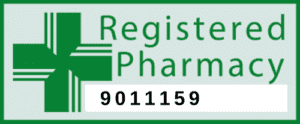- Mon - Fri: 9:00 - 17:00
- 01493 600610
Hay Fever Injections: The Safe and Effective Way to Relieve Your Symptoms
At Online Chemist, we understand the discomfort and frustration that hay fever can cause during the summer months.
That’s why we’re proud to offer our hay fever steroid injections service, which can provide relief for those who suffer from severe hay fever symptoms.
Our experienced clinician can administer the injections at the pharmacy - saving you time and hassle.
Price: £75
How it is given: Injected into the buttock.
Length of protection: One injection will protect you 3 to 8 weeks.
Age: 18 & over.
Location of clinic: Online Chemist, Gorleston, Great Yarmouth
What is a hay fever steroid injections?
A hay fever steroid injection is a type of injection that delivers a corticosteroid medication such as triamcinolone (Kenalog) directly into the body to help reduce the symptoms of hay fever or seasonal allergies. Hay fever, also known as allergic rhinitis, is a common condition that affects many people worldwide. It is caused by an overreaction of the immune system to allergens such as pollen, dust mites, or animal dander, leading to symptoms such as sneezing, runny nose, congestion, and itchy, watery eyes.
The steroid medication used in the injection is typically a synthetic version of cortisol, a hormone produced by the body’s adrenal glands that helps to regulate inflammation and immune function. When injected into the body, the steroid medication helps to reduce inflammation and alleviate the symptoms of hay fever by suppressing the immune system’s response to allergens.
Who is eligible for the injections?
Are you struggling with severe hay fever symptoms that just won’t go away, no matter what you try? If so, a hay fever steroid injection might be just what you need to get some much-needed relief!
These injections work by delivering a special medication called a corticosteroid directly into your body. This medication is designed to help reduce inflammation and calm down your immune system, which can help to alleviate the sneezing, runny nose, congestion, and other annoying symptoms of hay fever.
But who is eligible for this type of injection? Well, it really depends on a few different factors. For example, if you have a history of severe or persistent hay fever symptoms that just won’t respond to other treatments, a steroid injection might be a good option for you.
Similarly, if you have other medical conditions, like asthma or COPD, that are made worse by hay fever symptoms, an injection might be a good choice. And if you’ve had success with corticosteroids for other conditions in the past, our clinician might recommend an injection to help with your hay fever symptoms.
Don't let hay fever control your life. Let us help you get back to your normal self.
What are the contraindications for hay fever steroid injections?
Hay fever steroid injections may not be suitable for everyone, and there are several contraindications that should be considered before administering this treatment option. Some of the contraindications may include:
Active infections: Hay fever steroid injections should not be administered to individuals who have an active infection, as the medication can suppress the immune system and make it harder for the body to fight off the infection.
Pregnancy or breastfeeding: The safety of hay fever steroid injections during pregnancy or breastfeeding is not well established, and this treatment option should only be used if the potential benefits outweigh the potential risks.
Allergy to corticosteroids: Individuals who are allergic to corticosteroids should not receive hay fever steroid injections.
Uncontrolled diabetes: Corticosteroids can increase blood sugar levels, which can be a concern for individuals with uncontrolled diabetes.
Glaucoma or cataracts: Corticosteroids can increase the risk of developing or worsening glaucoma or cataracts.
Recent vaccination: Hay fever steroid injections should not be administered within two weeks of receiving a live vaccine, as the medication can interfere with the vaccine’s effectiveness.

What are the benefits of a hay fever steroid injections?
Hay fever steroid injections can offer several benefits for individuals who suffer from severe or persistent hay fever symptoms. Some of the benefits of this type of injection may include:
Rapid symptom relief: Hay fever steroid injections can provide rapid relief of symptoms, often within a few hours of administration. This can be especially helpful for individuals who are struggling with severe or debilitating symptoms that are not adequately controlled by other treatments.
Long-lasting effects: The effects of a hay fever steroid injection can last for several weeks to months, depending on the individual patient. This can provide sustained relief from hay fever symptoms and reduce the need for other medications.
Improved quality of life: For individuals who suffer from severe hay fever symptoms, the condition can significantly impact their quality of life. By reducing symptoms and improving overall health, hay fever steroid injections can help individuals to feel better and enjoy their daily activities more fully.
Reduced need for other medications: Hay fever steroid injections can help to reduce the need for other medications, such as antihistamines or nasal sprays, which may have side effects or be ineffective for some patients.
Customised treatment plans: Hay fever steroid injections are typically administered under the guidance and supervision of a clinician, who can help to determine the appropriate dose and frequency of injections based on the individual patient’s needs and circumstances.
What are the risks of hay fever steroid injections?
While hay fever steroid injections can provide effective relief for some individuals with severe hay fever symptoms, there are also some potential risks associated with this treatment option. Some of the risks may include:
Injection site reactions: Some individuals may experience pain, swelling, or redness at the injection site. These symptoms are usually mild and go away on their own within a few days.
Increased risk of infection: As with any injection, there is a small risk of infection at the injection site. This risk can be minimised by ensuring that the injection is administered in a sterile environment.
Increased blood sugar levels: Corticosteroids can increase blood sugar levels, which can be a concern for individuals with diabetes.
Adrenal suppression: Long-term use of corticosteroids can suppress the production of natural steroids in the body, which can have negative effects on overall health. However, the risk of adrenal suppression with hay fever steroid injections is generally low, as the injections are typically administered in a low dose and for a limited time period.
Allergic reactions: While rare, some individuals may experience an allergic reaction to the corticosteroid medication used in the injection. Symptoms of an allergic reaction can include hives, itching, difficulty breathing, or swelling of the face, lips, tongue, or throat. If you experience any of these symptoms after receiving a hay fever steroid injection, seek medical attention immediately.
Get back to your life without hay fever. Schedule an appointment today and start feeling better.
More information!
- NHS – Hay fever treatment: https://www.nhs.uk/conditions/hay-fever/treatment/
- British Society for Allergy & Clinical Immunology (BSACI) – Seasonal allergic rhinitis guideline: https://www.bsaci.org/guidelines/rhinitis
- Patient.info – Hay fever injection: https://patient.info/treatment-medication/hay-fever-injection
- Patient information leaflet – https://www.medicines.org.uk/emc/files/pil.6748.pdf





